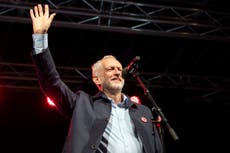Labour is moving closer to a second vote on Brexit – but Jeremy Corbyn's mind won't be easily changed on Europe
The Labour leader is worried that the EU could block key elements of his programme, including renationalisation and state aid for industry

A Final Say referendum on Brexit moved a step closer today as Labour delegates voted with their feet. They gave Sir Keir Starmer, the shadow Brexit secretary, a standing ovation after he promised that a referendum would be an option if parliament rejected Theresa May’s deal and Labour could not force a general election.
Significantly, Starmer said: “Nobody is ruling out Remain as an option [in such a referendum]”. This phrase was not in the version of his speech signed off by Jeremy Corbyn’s office. That Starmer added it is a reminder that, despite a superficial unity around a conference motion on Brexit, the Tories are not the only party divided on the biggest issue facing the country.
Starmer’s not so accidental ad-lib was a riposte to John McDonnell, the shadow chancellor, who gave the game away on Monday by saying that remaining in the EU should not be on the ballot paper in another referendum. Although he later backed down, McDonnell was not just speaking for himself but for Corbyn. But Brexit is the one issue on which they are out of step with Labour’s 550,000 members. Starmer’s standing ovation showed that the opinion polls are right: according to YouGov, 86 per cent of Labour members support a people’s vote and 90 per cent would vote Remain.
Labour’s shift today matters. It is a necessary step towards a Final Say referendum, but far from a guaranteed one. True, the party’s policy-making conference has inserted the “R”-word into Labour’s lexicon. Until now, the leadership has tried to placate referendum supporters by saying that “all options are on the table” or “we rule nothing out”.
There’s progress, but the Labour conference motion, which was approved overwhelmingly this afternoon, is cautious. It adds: “If we cannot get a general election Labour must support all options on the table, including campaigning for a public vote.”
This leaves many questions unresolved. If parliamentary deadlock resulted in an election, would Labour include a referendum in its manifesto? There would be a battle royal, with party members and most trade unions pressing for a referendum pledge.
Corbyn’s instincts would be to resist it. He might be able to muster a majority at the “Clause V” meeting, which under Labour’s rulebook finalises the party’s manifesto. It is attended by the national executive committee, the shadow cabinet, representatives of MPs, unions and the national policy forum and Labour’s Scottish and Welsh leaders.
With Tory and DUP MPs highly unlikely to vote for an election, Labour’s stance on a referendum is more likely to be tested in parliament. If a damaging no-deal exit loomed large, it is just possible that a majority would be forged if Labour, other opposition parties and perhaps 20 pro-European Tory MPs backed a referendum.
But would Corbyn do it? Despite today’s conference vote, it is doubtful. His true feelings were shown by his private irritation that the “R”-word loomed so large at this month’s TUC conference and, in turn, at Labour’s gathering. It was an unwelcome distraction from his desire to use this week’s conference to showcase radical policies. But Corbyn allies could not suppress debate on Brexit as they did at last year’s conference. Nor could they ban the “R”-word after promising to give power to Labour members, who flooded the conference with pro-referendum motions. His allies insist today’s conference motion does not really change the world, that he still has room for manoeuvre on Brexit. One Final Say campaigner admitted: “We are still pushing a rock uphill but we are making progress.”
Corbyn is worried that Labour risks alienating Leave-voting supporters in the north and midlands whose backing it needs to win an election. Pro-EU Labour figures insist opinion among these voters has shifted against Brexit since 2016. But Corbyn remains worried by the Tory charge – which will be repeated with knobs on after Labour’s conference decision – that he is trying to overturn the 2016 vote. That is why he insists he “respects” it.
Even if there were overwhelming evidence that Labour Leavers now back Remain, Corbyn’s attitude might not change much. Why? Although he campaigned for Remain two years ago, he was half-hearted, revealing his long-standing Euroscepticism. He is worried the EU could block key elements of his programme, including the renationalisation plans set out by McDonnell on Monday and state aid for industry. There is more truth to this on state aid than nationalisation. But Corbyn believes the EU threat is real, and would not be among those crying into their beer if the UK departs on 29 March 2019.
We can hardly blame Corbyn for sticking to the “constructive ambiguity” on Brexit that served him so well at last year’s election. It’s not just a device to harvest Remain and Leave votes; Labour knows that one day, it might have to unite a deeply divided country. But, as we approach the Brexit endgame, Corbyn will find it harder to face both ways. To govern is to choose. Sometimes, so is opposition.



Join our commenting forum
Join thought-provoking conversations, follow other Independent readers and see their replies